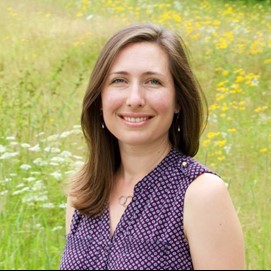
Dr. Tara Stewart Merrill
Assistant Research Faculty
Coastal & Marine Laboratory | 3618 Coastal Highway 98
St. Teresa, FL 32358
(850) 645-3489
tstewartmerrill@fsu.edu
Research and Professional Interests
The unifying theme of my research is understanding the causes and consequences of parasitism and infectious disease in aquatic ecosystems. How do largescale environmental changes—like climate change and biodiversity loss—influence pathogen spread? Why do epidemics start and what limits their size? To what extent do parasites constrain their host populations, and how do the suppressive effects of disease scale up to affect community structure and ecosystem function? To address these questions, I combine natural history, theoretical models, laboratory experiments, and field studies.
The Apalachicola Bay System is rich with opportunities for research at the intersection of aquatic ecology and infectious disease. My developing program tackles three aims in local systems:
- Identifying the importance of disease as a stressor for oysters, as well as the environmental drivers of transmission
- Building parasites into coastal food webs to better understand the full suite of top-down constraints on free-living species
- Evaluating how pathogens of people and wildlife (e.g. Giardia, Cryptosporidium, Toxoplasma) move from terrestrial habitats to the nearshore marine, and investigating strategies that can reduce their spread
Education
Ph.D. University of Illinois at Urbana-Champaign (2019)
B.A. University of California, Santa Barbara (2011)
B.F.A. University of California, Santa Barbara (2008)
Research Areas & Interests
Parasitology and disease ecology, population and community ecology, invertebrate biology
Professional Profiles
Publications
Hobart, B., W. Moss, T. McDevitt-Galles, T.E. Stewart Merrill & P.T.J. Johnson. It's a worm-eat-worm world: Consumption of parasite free-living stages protects hosts and benefits predators. Journal of Animal Ecology doi: 10.1111/1365-2656.13591.
Rogalski, M.A., T.E. Stewart Merrill, C.D. Growler, C.E. Cáceres & M.A. Duffy. 2021. Context-dependent host-symbiont interactions: shifts along the parasitism-mutualism continuum. The American Naturalist 198:563-575.
Stewart Merrill, T.E., Z. Rapti & C.E. Cáceres. Host controls of within-host disease dynamics: insight from an invertebrate system. The American Naturalist 198:317-332.
Stewart Merrill, T.E., S.R. Hall & C.E. Cáceres. 2021. Parasite exposure and host susceptibility jointly drive the emergence of epidemics. Ecology 102:e03245.
Stewart Merrill, T.E. & P.T.J. Johnson. 2020. Towards a mechanistic understanding of competence: a missing link in diversity-disease research. Parasitology 147:1159-1170.
Rapti, Z., T.E. Stewart Merrill, B. Mueller-Brennan, J.H. Kavouras & C.E. Cáceres. 2019. Indirect effects in a planktonic disease system. Theoretical Population Biology 130:132-142.
Stewart Merrill, T.E., S.R. Hall, L. Merrill & C.E. Cáceres. 2019. Variation in immune defense shapes disease outcomes in laboratory and wild Daphnia. Integrative & Comparative Biology 59:1203-1219.
Merrill, L., T.E. Stewart Merrill, A. Barger & T.J. Benson. 2019. Avian health across the landscape: nestling immunity covaries with changing landcover. Integrative & Comparative Biology 59:1150-1164.
Stewart Merrill, T.E. & C.E. Cáceres. 2018. Within-host complexity of a plankton-parasite interaction. Ecology 99:2864-2867.
Rosencranz, J., K.D. Lafferty, K. Thorne, K. Buffington, J. Takekawa, R. Hechinger, T.E. Stewart, R. Ambrose, G. MacDonald, M. Holmgren, J. Crooks & R. Patton. 2018. Sea-level rise, habitat loss, and potential extirpation of a salt marsh specialist bird in urbanized landscapes. Ecology and Evolution 8:8115-8125.
Stewart, T.E., M.E. Torchin & C.E. Cáceres. 2018. Invisible parasites and their implications for coexisting water fleas. Journal of Parasitology 104:101-105.
Merrill, L., M.F. Naylor, M. Dalimonte, S.McLaughlin, T.E. Stewart & J.L. Grindstaff. 2017. Early-life immune activation increases song complexity and alters phenotypic associations among sexual ornaments. Functional Ecology 31:2263-2273.
Buck, J.C., R.F. Hechinger, A.C. Wood, T.E. Stewart, A.M. Kuris & K.D. Lafferty. 2017. Host density increases parasite recruitment but decreases host risk in a snail-trematode system. Ecology 98:2029-2038.
Stewart, T.E. & S.A. Schnitzer. 2017. Blurred lines between competition and parasitism. Biotropica 49:433-438.
Stewart, T.E. & Merrill, L. 2015. Host sex and parasitism in red-winged blackbirds (Agelaius phoeniceus): examining potential causes of infection biases in a sexually dimorphic species. Canadian Journal of Zoology 92:21-29.
Merrill, L., T.E. Stewart, P.L. González-Gómez, A.L. O'Loghlen, J.C. Wingfield, V.A. Ellis & S.I. Rothstein. 2015. Epaulet size and current condition in red-winged blackbirds: examining a semistatic signal, testosterone, immune function, and parasites. Physiological and Biochemical Zoology 88:11-21.
